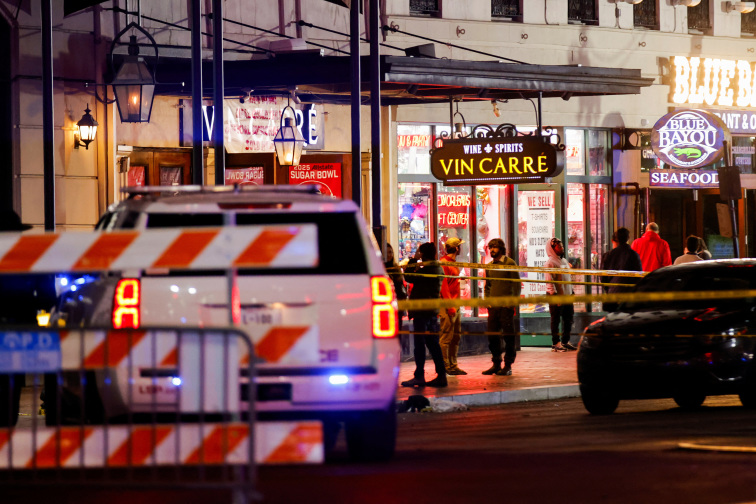(The Center Square) - Louisiana, our life-long home, reels from a terrorist attack that murdered at least 15 innocent people, injured several dozen others, and postponed the College Football Playoff Quarterfinal at the Sugar Bowl.
Acts of terror have once again left carnage within the borders of America. Shamsud Din Jabbar ramming a truck through a crowd of New Orleans revelers follows multiple acts of terror committed in our homeland: a bombing at the Boston Marathon in April 2013; an axe-wielding terrorist in Queens, New York in October 2014; a shootout in Garland, Texas over cartoon images of Muhammad in May 2015; an attack on two military installations in Chattanooga, Tennessee in July 2015; a slaughter at a Christmas party in San Bernardino, California in December 2015; and an attack on a Naval Air Station in Pensacola, Florida in December 2019.
When, like yesterday, a mass terrorism attack devastates a community like New Orleans, all eyes turn to the federal government to provide protection and relief. Although the U.S. government does have primary responsibility for America’s national security, state and local governments can – and should – take specific steps to protect their citizens and the nation from terror attacks. All the above attacks were ended by state or local law enforcement, including the New Orleans Police Department dispatching Shamsud Din Jabbar before he killed dozens more.
Louisiana has taken many of these steps. State and local law enforcement in Louisiana have received training to identify potential terrorist threats. The Louisiana Legislature has passed various forms of legislation to deter and prevent terrorism as well as provide justice to victims of terror.
Like almost every state, Louisiana created the crime of terrorism in the wake of 9/11. The acts of Shamsud Din Jabbar appear to meet the statutory definition of terrorism in Louisiana. Din Jabbar appears to have committed the “intentional killing of a human being” and the “intentional infliction of serious bodily injury upon a human being” while having “the intent to intimidate or coerce the civilian population.” He intentionally drove a truck into a crowd of revelers while displaying an ISIS flag. He, or his accomplices, might also have committed “aggravated arson upon … a structure” with the same intent.
Although applicable to the despicable acts of Shamsud Din Jabbar, Louisiana’s statute should be improved, including adding additional predicate crimes to protect against attacks on critical infrastructure. Other states have done so.
Terrorists often receive support from others, including from organizations or foreign governments. Comments by officials knowledgeable about the initial investigation of the New Orleans New Year’s Day attack suggest that Din Jabbar did not act alone. Although terrorists, like Din Jabbar, usually die while committing their crimes, those who provide terrorists with material support can be pursued civilly as well as criminally. Louisiana has passed statutes granting terrorism victims special causes of action, including enhanced civil damages, costs, attorneys’ fees, and asset forfeiture, against terrorists and their supporters.
Article 2315.9 of Louisiana Civil Code provides for a special civil cause of action for terrorism that includes “court costs and reasonable attorney fees.” This cause of action would be available to the victims of Din Jabbar and his accomplices.
Article 2315.9 can be strengthened by providing for exemplary damages (as apply to domestic abuse) or by providing for treble damages (as apply to racketeering and unfair trade practices). The prescriptive period could also be extended considering the recent extension of the general tort prescriptive period in Louisiana.
Louisiana also added terrorism and material support of terrorism as predicate crimes for Louisiana’s racketeering statute. That statute, which requires multiple acts, provides for treble damages and asset forfeiture.
Such causes of action facilitate civil suits against terror supporting organizations and state sponsors of terrorism. Civil discovery in those lawsuits can expose terror networks.
States can also create legal protections for citizens who report suspicions of terrorist activity. Louisiana has not yet done so, although such legislation has been attempted in the past. Both Mississippi and Tennessee have passed such “See Something, Say Something” laws.
State legislation can further empower state attorneys general to shut down non-profits that support, do business with, or associate with terrorists, foreign terrorist organizations, or state sponsors of terror. The Louisiana Legislature could entertain such legislation. Such legislation is currently being drafted for a sister state.
Recidivism rates for terrorists are high. Most do not rehabilitate. Terrorist offender registries, like sex offender registries, can be mandated by legislation to offer law enforcement more tools to prevent convicted terrorists from repeating their crimes. Louisiana passed a terrorism registry in 2019, but under the last administration the State Police failed to implement it. Texas has recently passed and implemented a terrorist offender registry.
In the wake of this latest terrorist attack on Louisiana soil, Louisiana’s state government should take action to protect its citizens, including considering the adoption of multiple policies to prevent another tragedy like the deadly Islamic terrorism attack that just befell our City of New Orleans.







News magazine bootstrap themes!
I like this themes, fast loading and look profesional
Thank you Carlos!
You're welcome!
Please support me with give positive rating!
Yes Sure!